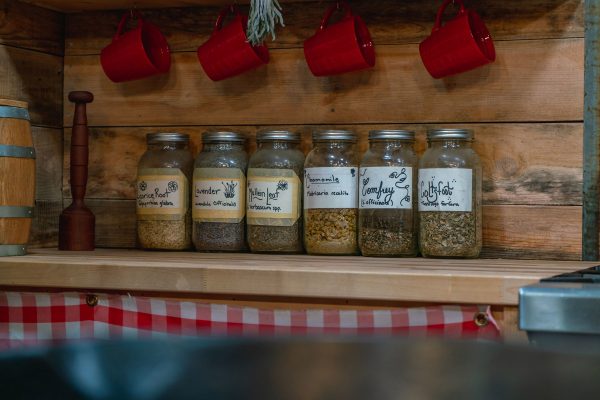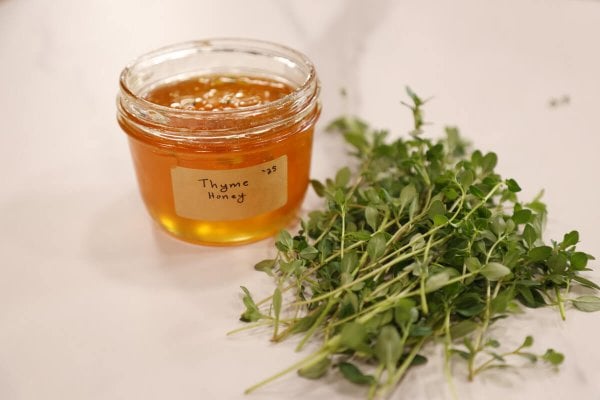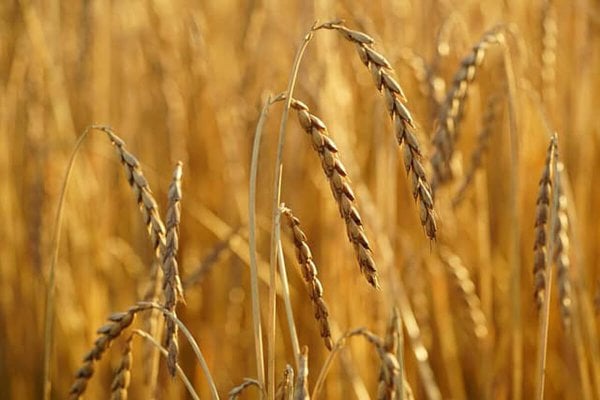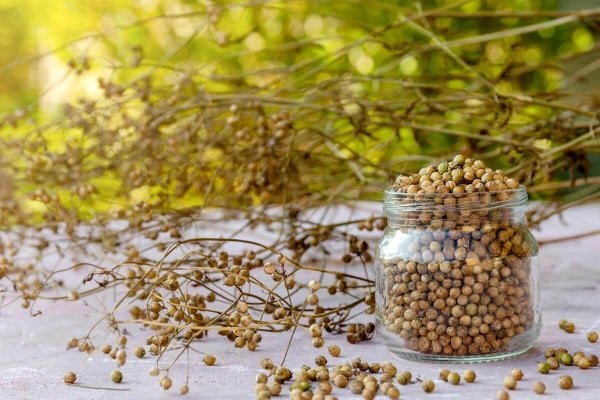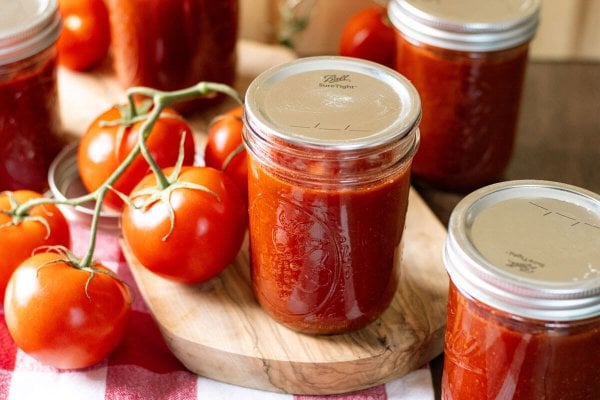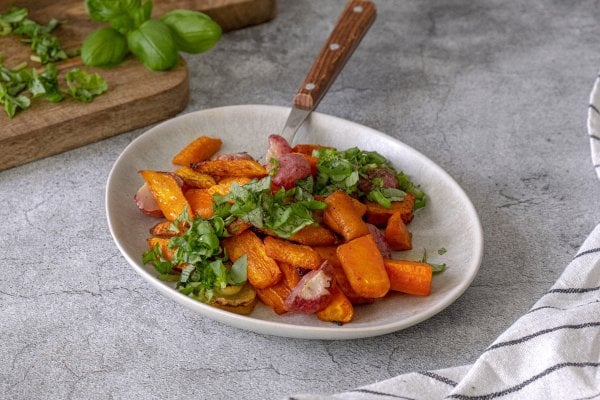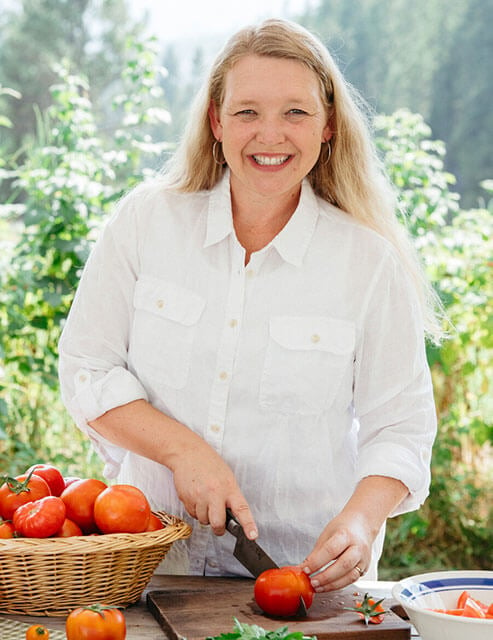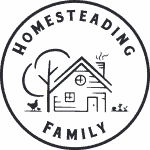Have you ever wondered about the health benefits that come with going “off-grid”? I had the privilege of chatting with Stacy of “Off-Grid with Doug & Stacy” to learn all about the secondary benefits she and her husband experienced when taking their home and lifestyle off-grid.
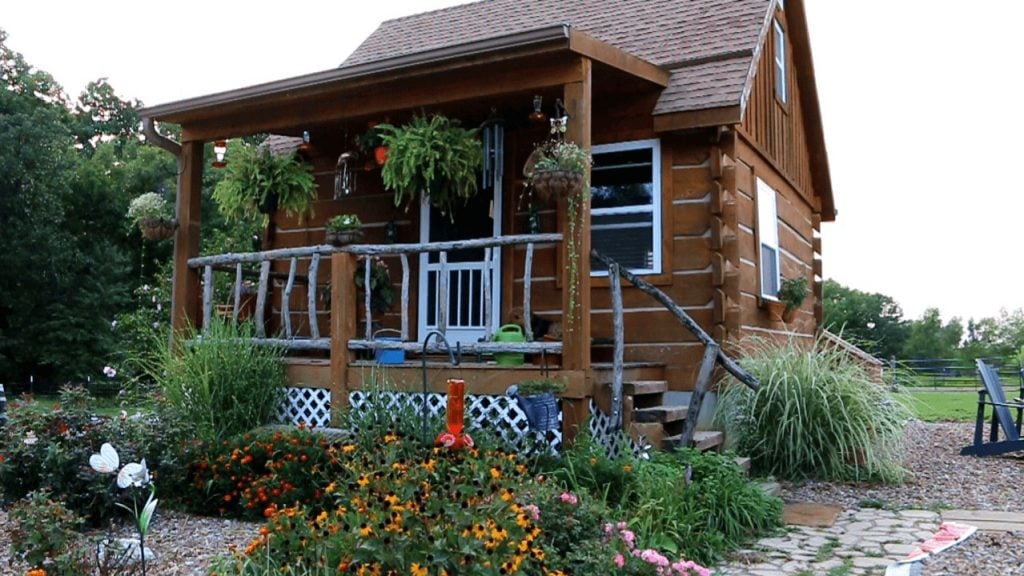
Stacy and her husband Doug have been living off-grid for going on 13 years now. They don’t have any bills coming to them, meaning they produce their own electricity, water, and heat, and grow or raise the majority of their food.
When Doug and Stacy first moved to their current homestead they moved from an “on-grid” home complete with hot and cold water, air-conditioning, and heat, to a cabin without any of these, including running water.
There were a lot of systems they had to put into place and figure out from scratch. This took some adjusting and taught them many lessons. But one of the added benefits of going off-grid was the health benefits they noticed from their homesteading and off-grid lifestyle.
As you can see in the video (and if you follow us on social media), Josh and I were fortunate to be able to go to the Homesteaders Summit actually go into the Redmond Salt mines where Redmond Real Salt comes from (using this link gives you 15% off your order!).
We’ve been learning so much more about the healthy salt we love and recommend to you all! Redmond Real Salt has over 60 of the trace minerals that our bodies need to function! Adding mineral-rich salt to your diet is just one of the small changes you can make in your diet to improve your health.
Keep reading for the additional benefits Stacy shares in the video.
Health Benefits of Off-Grid Living
It’s important to note that I am not a certified medical practitioner. This post is not intended to diagnose or treat but is for informational purposes only. Please contact your healthcare professional before introducing new herbal and natural remedies into your wellness routine.
Circadian Rhythms
One of the benefits they noticed when going off-grid was that their circadian rhythms were adjusting to the daylight hours.
By getting into the routine of the sun, they found they were sleeping better, they fell asleep easier and found they were actually tired shortly after the sun went down. Their bodies naturally adjusted to the rhythms of the seasons.
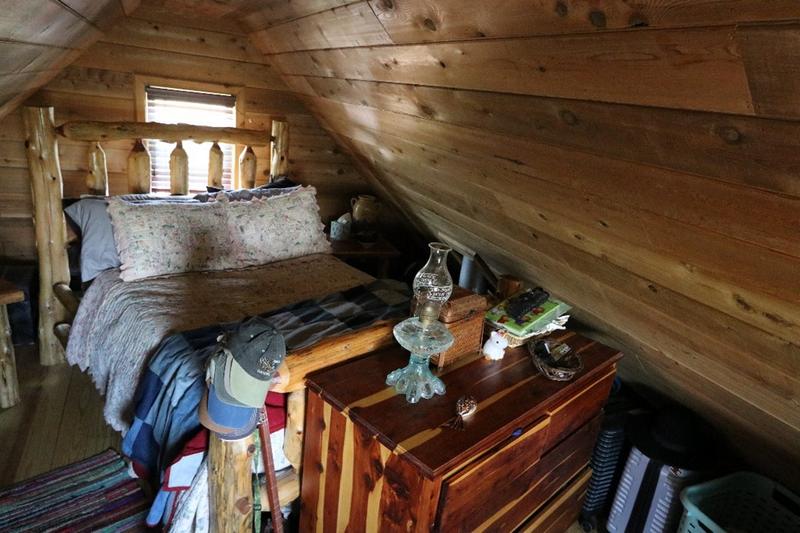
Better Sleep
Quality sleep is essential for your health. (Source) In order to achieve deep sleep, it’s important to remove electronic devices from your bedroom and eliminate artificial light a few hours before bedtime.
If you don’t get adequate sleep, especially deep sleep, then your cortisol levels are higher than they should be which affects hormone balance and all sorts of other issues. Something that Stacy recommends for people who seem to have a difficult time losing weight, despite a healthy diet and adequate physical activity, is to focus on achieving solid deep sleep each night.
Hormone Regulation
Another benefit of living off-grid is that they’re outside many more hours than when they lived in the city. Their lifestyle is such that they’re outside in nature on a daily basis.
Stacy especially noticed that getting outside before 9 AM to get early morning sunlight was helpful in regulating her hormones.
They also regularly got exposed to a minimum of 20 minutes of midday sun each day for proper vitamin D production. (Source)
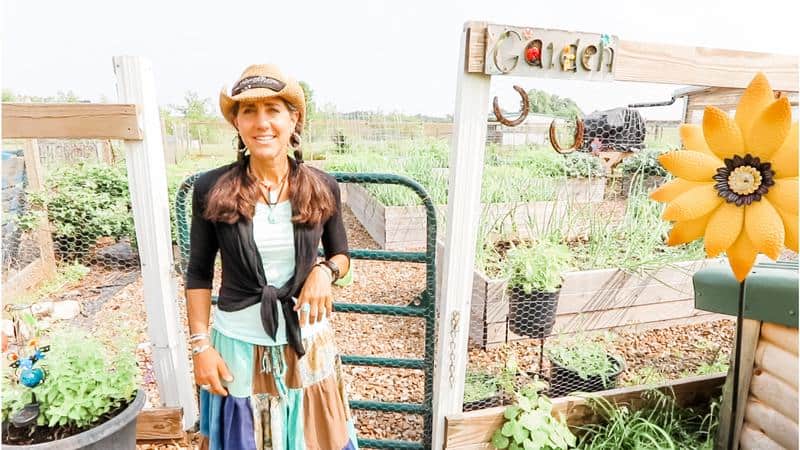
Benefits of Grounding
Walking barefoot through the grass or garden is so beneficial in reducing pain and inflammation in our bodies. (Source) Doug and Stacy regularly ditch their shoes for their daily “grounding”.
Also, “there is increasing evidence that exposure to plants and green space, and particularly to gardening, is beneficial to mental and physical health.” (Source)
Consuming Fermented Foods
Because Doug and Stacy don’t have a traditional refrigerator, they rely heavily on their root cellar to store their food. This requires them to consider the forms of food preservation, and fermented foods are a large part of how they store foods.
Eating probiotic-rich foods is so beneficial for digestion, proper gut health, and everything else those functions help regulate. It also just so happens to be a form of food preservation that can last for a year or more on a pantry shelf. (Source)

The Biggest Challenge of Living Off-Grid
I had the opportunity to ask Stacy what the biggest challenge was when transitioning from “on-grid” to “off-grid” living. Her response was that not having air-conditioning was one of the most difficult things to get used to.
The first year they moved to their land there was a drought and it didn’t go below 85 degrees for about a month. After they made it through that first summer they figured they could do anything.
They’ve figured out different methods of providing shade when outside, or planting trees that would grow up and eventually shade their house. They adjusted their schedules to work in the early morning hours when it was cooler. They even realized the benefits of taking cold showers.
Even if you do live on-grid, Stacy recommends figuring out other methods of keeping cool because it’s very possible for the power grid to go out during the hottest days of the summer or for scheduled rolling blackouts. It’s important to have methods in place to help you keep cool so you don’t get overheated or get heatstroke.
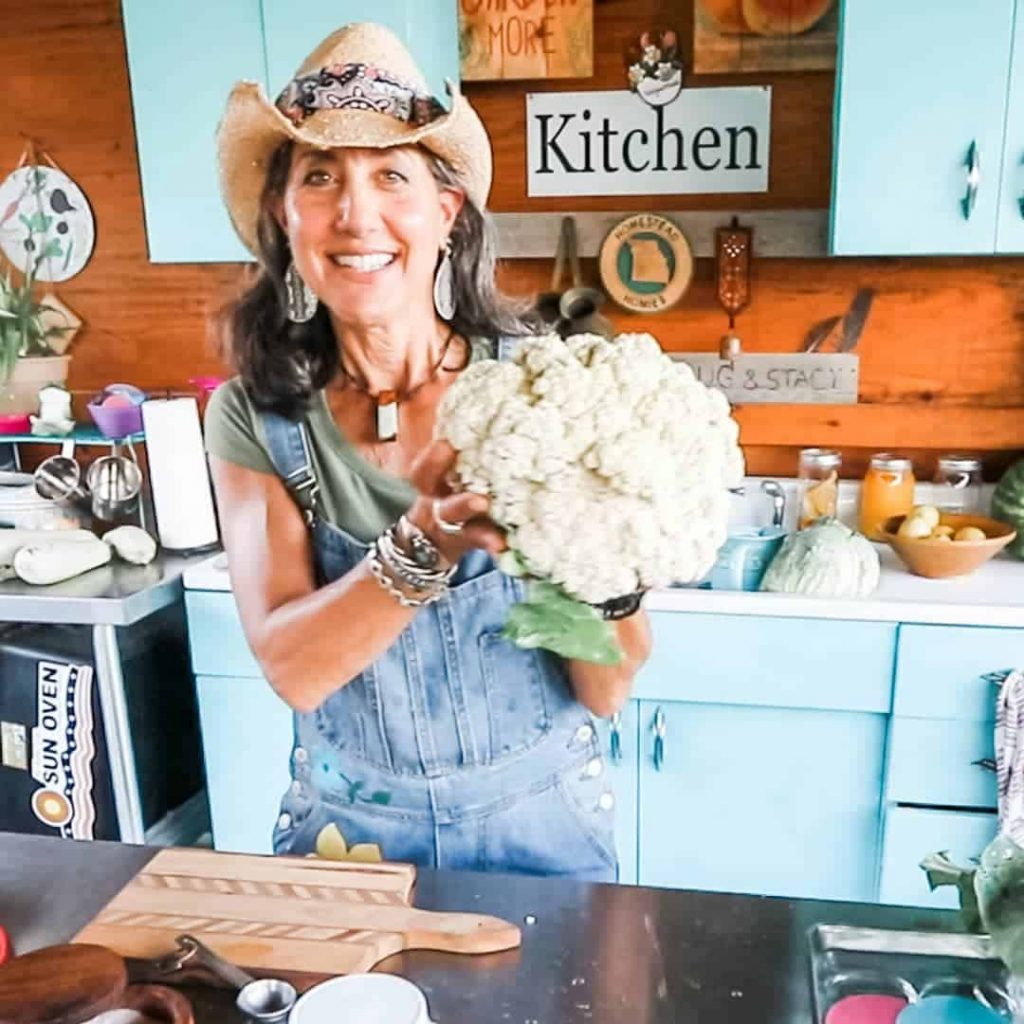
Encouragement From Stacy
One of the things that Stacy notices most when people decide to go off-grid is that they want to have all the same luxuries they had while living “on the grid”. It’s important to realize that this isn’t always possible unless you have exorbitant amounts of money to spend on your off-grid, solar power setup.
Readjust your expectations to be realistic for your individual situation. Know that no two homesteads look alike. And also realize that getting systems set up and working smoothly takes time. So be patient!
Where to Find Doug & Stacy
You can find Doug and Stacy on their website at Off-Grid with Doug & Stacy, as well as on their social channels below!
- YouTube – they post new content multiple times per week!
- Facebook – get updated about all their new videos.
- Instagram – see behind the scenes of their off-grid life.
More Posts You May Like
- What is Homesteading?
- First Time Homesteader with Jessica Sowards
- Direct Primary Care – Going “Off-Grid” With Your Health
- Things to Consider BEFORE Going Off-Grid
- How to Prepare For Power Outage (Short-Term Power Outages)
- What is an EMP Shield (And Do I Need One?)
- 3 Things You Must Do To Increase Self-Sufficiency
- Building Resilience with Justin Rhodes
Carolyn: Hey guys. It's Carolyn with Homesteading Family and welcome to this week's episode of the Pantry Chat. Today, we're obviously not in the pantry. We are in Utah and I'm here with Stacy from Off Grid with Doug and Stacy. I'm really excited to have you.
Stacy: I know. It's so nice to finally meet you. It's kind of neat, you see these people on YouTube and on videos and things and it's you get to meet them face to face. That's really cool.
Carolyn: Yeah. Well, and you guys know that when we're recommending other YouTube channels, Doug and Stacy is one of the ones that we recommend because you guys are actually living the lifestyle.
Stacy: Just like you.
Carolyn: So many channels are out there and we love them, we think they're great, but a lot of times they're learning themselves or they're kind of just taking you along on their journey. And that's great. We love those things. They show some of the beginning mistakes and all of that. But if you're actually trying to learn how to live the lifestyle, it's great to be learning from people who are actually doing it, actually immersed in it. And Doug and Stacy have been living seriously off grid for how long now?
Stacy: It's going on 13 years this year.
Carolyn: 13 years. For those of you guys who follow the Pantry Chat every week, you know Josh and I have been talking about off grid, we've been talking about kind of this misnomer that just throwing up some solar panels takes you off grid. And about all the different types of off grid that we really need to look at. It's not just the electrical grid.
Stacy: Right. It's basically, like we say off grid, it's we don't have any public utilities. We don't have any bills coming to our house because we are our own sewer person, we are our own electric person, we're our own gas person. We just do it all.
Carolyn: That is amazing. And it's very rare to be able to find somebody who's living it to that level. And so I'm really excited to today be talking about some of the practicalities, what is that like to actually live day to day? But first, we can't forget the chit chat because that's my favorite part, especially when we have a guest on, because Stacy is so much fun.
Stacy: Yeah, it's fun.
Carolyn: I wanted to share with you guys right now, we are here in Redmond, Utah. I don't think that's the actual technical city we're in but we're here at the Redmond salt mines. Is that what you would say?
Stacy: Yes, the salt mines.
Carolyn: And we've been having a blast. We're here for the Homesteader Summit and learning a lot about salt but we also yesterday went down to 800 feet.
Stacy: Oh yes. In the mine. It was so cool. And we were surrounded by salt. It was just amazing. It was so beautiful.
Carolyn: And what I thought was really interesting is the entire mine is salt. They said, "Go lick the walls." Everything in here is salt.
Stacy: Yeah. You're driving on it. We're driving, I thought, oh my gosh, you're driving on it. The walls, all the way above. And it's just so cool.
Carolyn: It really is. It's a different experience to be down there. The big, big caverns that they've opened up. It's really been a lot of fun to be down here and get to hang out with some other people and really learning a lot about salt. I think I'm going to have a video coming out for you guys just about the health of salt. I know a lot of times, every time I mention something like use healthy salt for this, people push back and they're like, salt's just sodium chloride. That's all it is.
Stacy: No, it's not.
Carolyn: And I go, oh no, it's not. And I'm really learning about that here. It has been very interesting.
Stacy: Oh, it's wonderful. It's amazing how I think over the years, how the media and people, things that are good for us they make it bad for us. And then people are getting sick because they're not doing these things because salt is good for us. We need it. Your body is made up of those trace minerals that we need, the human body needs those. And then this unrefined salt, the Redmond salt, is filled with it and your body needs it. It's so, so important as opposed to an iodized salt or a refined salt, that's been high heat processed, has anti-caking agents in it. And it's just terrible for the body and the body doesn't know what to do. It thinks it's getting minerals and it's not getting anything. It's so crucial for our bodies.
Carolyn: Well, and I was just learning that a lot of our table salt actually has sugar in it, especially in Canada. It actually will say it right on the label that it has sugar added into it. And I guess it has to do with the anti-caking and just different parts of it. And this is so great because they were sharing here yesterday that the Redmond salt has over 20 trace minerals that your body needs.
Stacy: I think it's even more than that.
Carolyn: I bet it's more than that.
Stacy: I think it's 60.
Carolyn: It's amazing. And so you're getting all these great things, especially since we've lost it from our food supply.
Stacy: And from our soils that we're growing. I know even for us, every day we drink, we have water, we live off a 100% off of rain water that we catch off our barn and I'll put a pinch of salt in our water every single day, so that way you're getting those trace minerals. It's really important for the body.
Carolyn: That is so good. So much fun. Just for a little bit more chit chat though, what have you, I know you've been up to being here and you actually drove a ways to be out here.
Stacy: We did. We drove.
Carolyn: Utah is a long ways from your house.
Stacy: It's a very long drive. A little over 18 hours.
Carolyn: But what have you been doing on your homestead for the last week before you jumped in the van and drove out here?
Stacy: Let's see. Well, we were getting a little good weather. I always try to get my onions and potatoes in by March 17th. That's my goal always. I got quite a few in, I'm going to probably put more in. I had a bag. I had acquired a few bags of Yukon potatoes that I had gotten from the Amish and they were really sprouting. They tried to get rid of them really quickly and so I bought a bunch of organic potatoes, so I put some extra Yukon Golds this year because I do the Kennebeca and I also do the Red Pontiac. I like those a lot too. What are your favorite potatoes?
Carolyn: We always do a russet, a Yukon Gold and a red but I cannot tell you the variety of the red that we're growing right now because we have this great local organic farm that grows mostly, where we're at in North Idaho we do root veggies really well because they can handle the frost.
Stacy: Yeah. You got to have the climate.
Carolyn: You've got to be able to put something in that's not too sensitive out there. And so we just, they also sell seed potatoes. We just went and got whatever they had and the varieties weren't labeled but they've done so well for us that we're just like, they're just the red potatoes. We don't know what they are, they're red.
Stacy: And I think the other one starts with Norland, it's called Red Norland. Those are the two good red ones, I think the Norland and the Pontiac.
Carolyn: I feel like they might be Pontiac but I am not a 100% sure on that. But they're good.
Stacy: That's all that counts.
Carolyn: They're good and they grow really well and we don't have an actual root cellar or a great place to store them. And so we're still working on that part of our storage. I had to translate them to their next life. They went from route storage into the freeze dryer and into some stews and different things that went into jars on the shelf. Keeping that going.
Stacy: That's good.
Carolyn: Good. You're already planting things out in the ground and that's exciting.
Stacy: Just a few. One thing with the sugar snap peas, you have to get them in a few weeks before your last frost date. A lot of times people wait and sometimes it's like, why aren't they growing? It's because they don't the heat at all. I did some sugar snap peas and I'm trying to think, I went ahead and planted some seeds like cilantro because I know it'll pop up. It'll take a little bit and needs a little warmth but it'll pop up because it likes the cool weather. And some herbs, parsley, some arugula. I had some red romaine. Just a few things because you never know because some times you get earlier season and I just plant extra things and sometimes if it gets too cold and they're going to die, then I'm going to plant some more again. And at least I know I'll have some extra because we have cold frame too.
I have a cold frame in front of the house, which is a box made out of Tuftex panels. And it's just made out of cedar that Doug had made and it works out great. I just go ahead and I'll plant things and many of my things will last throughout the winter in there.
Carolyn: Oh that's nice.
Stacy: Some of your kale and even my parsley, my parsley's a rockstar. I have a little bit of that right now too. It's going good.
Carolyn: It's going good.
Stacy: I'm just looking excited for that. And then I'm bottle feeding a lamb, which is a lot of work but I'm getting them down to two bottles a day so that'll help me out a lot.
Carolyn: Wow. You have somebody at the farm right now bottle feeding for you. It's a good time to go on vacation.
Stacy: Yeah. She sending me pictures so it's good.
Carolyn: Oh good. That's good. Well, I figure early spring planting is the kind of gambling I like to do. It's the odds are pretty much in my favor. I kind of have a 50% chance of winning. And I put the seeds out and if I lose and they all get frozen, a packet of seed costs three bucks. It works for me.
Stacy: And you can plant it again. Because that's what I do. A lot of people are like, oh I planted this and it died. I'm like, well I always plant extra. For zucchini, you never know, those squash bugs are all over the place so I'll plant three or four as opposed to just one. And then I have garden beds and I'll plant them all over the place. It just depends, I companion plant so I'll plant maybe a variety of tomatoes, peppers or whatever and herbs in one and maybe I'll do eggplant. I just kind of mix it up. And then that way, if I have a tomato plant over here maybe that had some problems and then over this one may not. And the same for the squash bugs and for my kale and my broccoli or cruciferous vegetables, I just kind of move them around because some of them do better than others.
Because I learned the hard way. I had a mulch pile kind of close to our garden and you're not really supposed to have your mulch pile close to your garden because the squash bugs can overwinter in very, very cold temperatures underneath your compost because it stays warm. And then when you get ready to plant again and you're planning kind of near it, it'll be inundated by the bugs.
Carolyn: They just wander right on over.
Stacy: They're like, oh look, I have more fun to eat. I learned the hard way that I don't want to have my mulch pile near where I put my garden stuff.
Carolyn: Yeah. That would make sense. Good. Well, my main garden is still under snow when we left. We still have a nice probably inch of snow on the main crop garden. The cottage garden though is completely defrosted and I was out there starting my battle against the grass I have.
Stacy: Oh, it starts coming up.
Carolyn: Because it's my perennial garden and I'm trying to work out, we have grass walkways in it, which I kind of keep thinking, I don't think this was the most brilliant idea to put grass walkways next to my thyme.
Stacy: Okay. I just did a video about herbs too. Thyme is good. You could put that in your.
Carolyn: Well and that's interesting because I do have lots of thyme in there, but maybe you just line the walkways with it.
Stacy: Where it's coming up.
Carolyn: It's pretty large and I'm thinking about putting the edging in all the way around the walkways. As much as that would be a lot of work and then getting all the grass out of there and putting flagstones down and then I love the little ground cover camomile.
Stacy: Oh yeah, the low one.
Carolyn: Yeah. All the way in there.
Stacy: Is that the Roman? That's the Roman.
Carolyn: I can never keep the two straight.
Stacy: The one's shorter.
Carolyn: The short one is one and then there's the tall one.
Stacy: The German is the taller one and the Roman is the low growing on.
Carolyn: And so the German is the annual, so you have to plant it every year.
Stacy: That's the one. But camomile is just crazy because I learned that the hard way too. A lot of my stuff I like to do easy gardening so I just like things reseed itself.
Carolyn: Let it self sow.
Stacy: But camomile has seeds that are so tiny. They'll just poof, you just blow it away. They're so little, they float. They go everywhere and then the first year, this is many years ago, I kind of let it go to seed. I had camomile going, it was over by our house, in the rocks. I have it growing everywhere, which is nice. I like it. Because you can pull it up and transplant it where you want and it works out good. But just know that it will do that. But camomile is wonderful.
Carolyn: Luckily in our climate, we have things don't tend to be as invasive because they have such a hard winter. I also have my camomile self sowing and it's actually is behaving itself.
Stacy: Oh good.
Carolyn: Pretty nicely.
Stacy: You have better temperatures than we do.
Carolyn: There are a lot of other things in my cottage garden that are not behaving and I've gotten to where I don't have to plant anything pretty much now but I am pulling them up by the bucketful. My elecampane is spreading like crazy.
Stacy: Is it?
Carolyn: All of it. All of it. And then of course I've got a big wall of hops and that just wants to take over everything.
Stacy: I'll say.
Carolyn: And so it's kind of fun but I figure I've gone from that stage where you're planting and putting in, to the stage where I'm just ripping it out. I'm so merciless.
Stacy: Sure, sure. Giving it to your friends. Don't you want to grow this? Don't you want to grow this?
Carolyn: On Facebook, in the local groups, anybody come take out shovelfuls of herbs, whatever you want, just come take it. That's kind of my thing. I've started that annual wars that I have going of just keeping things in their place and keeping the grass out of it.
Stacy: That is hard with that grass but you do have to kind of dig it out.
Carolyn: You do. And it gets down there pretty deep. And so I go through the entire, and it is a big garden and I go through the whole thing once a spring and try and rip out all the weeds.
Stacy: Sure. You have to do that, otherwise you're going to be in a mess in a few weeks because you're going to have too much grass everywhere.
Carolyn: Okay. We're going to move on to the question of the day now, which I can't remember who it's from and I doubt I can pull it up that fast but somebody was asking about how to get clean, unwashed eggs. And if you've watched my video on egg preservation, you'll know that there's different methods of egg preservation and some of them require you to leave the bloom on the eggs, which is that protective waxy coating that comes out naturally from the chicken. That allows your eggs to just sit on the counter alone for weeks on end.
Stacy: Months.
Carolyn: A really long time.
Stacy: Many months. If you have cooler temperatures. Because we live off grid and so my eggs are sitting out all the time. I could keep, in winter where it's cool, I could keep them many, many months right when they're fresh. As opposed to in the heat, you think about it, people in these hot countries all over the place, they're just having their eggs out. I leave my eggs out. But when it's very, very hot and humid and let's say our cabin's a 100 degrees and it's really, really hot, they're not going to last as long. They might get a little more runny when you crack them open. And that time, they may only be good for a couple months but generally they will last awhile.
Carolyn: They last a really long time.
Stacy: Don't wash the bloom off. And then a lot of people when you wash the bloom off, that bacteria that you get could go inside. You have to be careful how you do it.
Carolyn: Now our viewers who are in other parts of the world, like Europe, think we're kind of crazy because they don't, even the commercial eggs are not washed just because of the health protection of having the bloom on the eggs. But here in the United States, commercial eggs are required to be washed. If you want to use some of these old fashion preservation methods, like just leaving them out on the counter.
Stacy: You know what I think of a lot? This is when a woman has a baby and the woman has the baby naturally. They're getting their immune system, they're just being washed as they come out of the birth canal and it's kind of the same thing for the egg, you're getting that protective coating. And so it kind of helps the child, it helps the egg and it just helps to preserve it.
Carolyn: It kind of helps all of it. It really is good. But you don't want to have poop on your eggs. You don't want to have dirty eggs, especially if you're doing something like a lime solution where you're storing the eggs in a bucket for extended periods of time, you really don't want to be putting manure, chicken manure into those solutions. How do you get a clean, unwashed eggs. To some people that sounds like a misnomer, aren't all clean eggs washed? No, they don't have to be.
Stacy: No, not at all.
Carolyn: What are your tricks for keeping your eggs clean?
Stacy: Well, I think the big thing with when your eggs is to keep your nesting boxes full of straw or some type of matter. Because if they have a nice nesting box, because just like you, do you want to sleep in a bed that you have all wrinkled pillows and your sheets are all messed up? It's kind of the same thing. When I keep my nesting boxes full of straw, they are happy to go in there and then they lay them and then when it's very nice and clean, the eggs are going to stay clean because a lot of times, if they're in there, they're going to poop in there, whatever. You just make sure you just keep it nice and tidy, putting that straw in there.
And then another thing that I've been doing is I grow a lot of perennial herbs like you, I grow a lot of mint and I do have some mint that has gone kind of crazy. I decided an experiment around my blackberries to put it between the blackberries, just to help. Well, it took over but it was good for me because I'm using that for my chicken coops. It grows pretty tall. In the middle of summer, I'll go ahead and cut it from the bottom and then I have all these tall pieces and then I'll just kind of break it apart, cut it up and throw it in the coop so it deodorizes it in the summer months. And then I also will put it in their nesting boxes because the smell, they just love.
I also will toward the end of the season, I'll cut it. I just let it drop and then I'll let it dry or I'll hang it, either way, whatever I'm doing. Because for some of you guys that don't know, that's a herb that will dry very nicely for teas because it's full of essential oils and it will keep its flavor throughout the season as you dry it. I go ahead and I'll tie it and I'll hang it until it dries and then I'll use that and crunch it and I'll put it and throw it in the coop because it's going to help against pests, deter against mites and parasites and things like that. And also the smell helps them, makes them happy, the chickens, they love it. It makes them want to lay more. And I just keep that also in their nesting boxes. Just another thing to help.
Carolyn: Steve, that's great. That's so good to get those because you have the insect repellent aspect of that too and helps with the mites.
Stacy: And your coops smell good.
Carolyn: And the coop smells good.
Stacy: They smell great.
Carolyn: When you're in the middle of something like mud season, if you live in a place where you have mud season, it can mean that you have to put fresh nesting material.
Stacy: Every day.
Carolyn: Every single day.
Stacy: Because their feet, their feet get all muddy.
Carolyn: Yeah, they're muddy. That's just the way it is. As the summer progresses and things dry out, you shouldn't have that kind of problem. People ask me all the time, what about duck eggs? I'm sorry. Duck eggs are dirty.
Stacy: They are, they are.
Carolyn: That's the way it is.
Stacy: But they are, I think they're made though to be like that because they're out in the dirt, in the mud all the time and so they have a thicker shell because it's much harder to break. I think they're a little bit more protected over some of the others because some of them I know they've been out, I've gotten them around our pond and they've been there for a while and you'll crack them and you think, oh they're going to be bad but they're still good.
Carolyn: Yeah. Well and the thing with the duck eggs too and even the chicken eggs, it's important to remember, you don't have to worry about a little bit of mud. That's not bad. That's not a problem. In fact, you probably end up with protective elements from it, if you have good bacterial content in your soil but what you're really looking to avoid when you're bringing it into the kitchen and storing it for the long term is the manure. That's what you're really looking for. Don't be too thrown off by little streaks of mud or little bits like that. That's not that big of a deal.
Stacy: Well and another one too is when you get a cracked egg, which is so annoying because you'll have this beautiful nest of maybe a dozen eggs and then there's one cracked one and it ruins all of them and it gets it all over. The big thing for that is don't let your eggs sit there for a long time, make sure you're collecting your eggs because then they'll stand on them and they can break them and that really causes a problem. Or those are the eggs that you're going to eat right away if they get like that.
Carolyn: There you go. Good thoughts. Well, let's jump into the topic of the day. I'm really excited to be talking to you about it because we've never gone completely off the power grid personally. We have focused on developing the skills and the infrastructure to allow us to be able to just go completely off grid at some point and not kind of the hybrid, generate our own power in our own home. And so again, it's just super rare to be able to discuss with somebody who's actually doing it, what that's like day to day. I know there's a glorified version of that. There's the romantic version of I want to sit in the rocking chair by lantern light.
Stacy: The fire.
Carolyn: And that'd be so wonderful. But there's also the day to day reality that you are actually doing life every single day in this place. And so talk to us about just the challenges, the benefits, what you've learned along the way.
Stacy: Well, so we've been doing this about 13 years and when we first moved out there, we moved from the air conditioning, we moved from having lights until 11:00 o'clock at night. We had all that. When we moved out there, there was a little transition, it was cool. We had to work hard. At the time we didn't have running water at all. We hadn't figured out our systems. We hadn't put them in place and we had to wear your headlamps and have to do everything that you're going to do. And in the middle of winter, at 4:30 it starts to get dark, so you have all those hours you're going to do things. If you're going to prepare your food, you're going to do whatever. That took a little adjusting but I'll tell you over, because we had the lanterns and you have to get ready for the lights to kind of dim, but really your body is made, your circadian rhythms to kind of slow down. The sun starts to go down and those dim lights. It started changing our health, is the big thing.
I started noticing we were sleeping better, that our health was better. Just everything about it because our circadian rhythms were really kind of getting back in sync again. You get tired at a certain time, at 9:00 o'clock, 8:00 o'clock you're like, know, oh my gosh, it's time to go to bed. Doug would be like, oh, I'm tired. Let's go to bed and be 6:00 o'clock. But over time, your body adjusts to that and it's no big deal for me now. I'll go places and it's kind of dark. People are like turn the lights on, because it doesn't bother me. I'm used to that.
And it was just one of those kind of things that you just do it day after day and you just start to get used to it. And another big part was getting into with nature. I think a lot of us, even let's say you do have a farm and you are raising chickens or you're having a garden and all that. There's a lot of people that just stay inside all the time. They're staying inside, hanging out, doing their things. They might just go outside and come back in. But I think a big component of this and especially if you want to talk about our health and being in tune with nature is being outside. And being outside. And it's really important to be outside first thing in the morning, especially before 9:00 o'clock because you want to kind of get your eyes set to the sunlight because that will set your circadian rhythms.
It will help your serotonin levels. It's going to help you to sleep better. It's going to help your hormones all over to get that sunlight, especially getting it on your skin because that's the best way, about 20 minutes or so to help absorb, getting that vitamin D and then eating good foods. You're growing a garden. It's not just eating foods. It's all of it. It's getting out in nature. It's getting good sleep. For some of you guys that don't live off grid like I do, maybe having candles or a lantern that you can dim the lights or if you have a lamp that you can dim the lights. The big thing and the studies show, we get our sun from the sky, and it sets down on you. In your home, when you have those bright lights shining down on you, that's what's going to cause the problem where your cortisol levels are going to go up when it's time for bed and then you're watching these screens in front of you. It's really important to keep the light, dim them where it's lower.
Carolyn: Interesting.
Stacy: You don't want it above you because that's going to affect you.
Carolyn: I've read about how people, even in the 40s and the 50s, even when they started having electric lamps, they didn't have the big full room lighting necessarily. And they would often keep the rooms dimmer. The rest of the house would be dark. Even though they had electricity, they were still kind of implementing some of those things and that they just, they weren't used to what we're used to, which is these glaring bright LED lights over us and lighting everything all the time. And so it's a very different thing for your health. And it's really interesting.
Stacy: Well, and a lot of people are like, oh, I can't lose weight. I'm having problems. I eat good. I even exercise. What's wrong? Why can't I lose weight? For a lot of you guys, and people think, eh, it's really nothing. Your sleep is a huge component. I can't talk. A huge component to your health. Huge. I can't tell you enough. You want to get that good deep sleep, you go up and down your cycles, five, six times. You want to get into that good deep sleep. And by just doing simple things like putting your filter on, that blue light filter on your phone or your computer, don't have the screen in front of you at least an hour before you go to bed, dim the lights. You want to set the mood and especially don't have your phone or anything like that electrical by your head because those electromagnetic frequencies are going to affect your brain waves.
It's very important that you set the stage. You should have nice little nest in your room. Don't have any of that technical stuff near you at all by your head at all. Put it in the kitchen, get it away from you and then you'll sleep. Because if you start getting good sleep, because it'll help everything, because if you're not getting the right sleep, then your cortisol levels are raised, your hormones, everything gets whacked out and then your body's thinking, oh, it's fight or flight and you're going to store a body fat and it's just not good. If you're in bed between like 10:00, 10:30, no later than 11:00 and then you get up, because we're used to going to bed shortly after the sun goes down and getting up when the sun's coming up, you'll notice a lot of health benefits if you're consistent with that. It's not crazy. You need to start doing stuff like that because it will help your health.
Carolyn: Makes a big difference.
Stacy: It really does.
Carolyn: That's really amazing.
Stacy: And then you may even notice you start losing weight, where you're storing weight certain places, it's huge.
Carolyn: That's really interesting. And that's kind of one of those just side benefits of going off grid. That's not even than something most people are thinking about, but just it naturally controls how much electricity you can use. And so you're controlling your light but that's just a side effect. I think that's really neat. What would you say the number one, on a day to day basis, the biggest challenge with being off grid? I want to call it like off off grid because I think we really have to define the difference between being off grid, where you're just mimicking being on grid because you have all the power generation that you want, versus it's a big difference.
Stacy: Well, and that's a big thing for a lot of people because they go off grid thinking that they're going to have everything that they had before. They're having all the plugs, they're having the air conditioning because air conditioning, you have to have a lot of solar. It's not going to be a $10,000 unit for solar. You're going to have to have 50, 60, $70,000. If you want to have everything that you had on grid. That's what a lot of people do. See, we went off grid not having anything. If I get it a little bit of something it's good. But it is, it is definitely something I think. And wait, you were talking about the health aspects of it but besides just the sleep, it's changed my whole life. It helped between Doug and I just changing from the foods, getting out in nature, lowering the stress, getting the sleep. It was a whole full circle.
Then we go barefoot. We're grounding with the earth. People are wearing shoes all the time. You need to be connected to the earth, letting go of the electricity, static electricity in your body. And that will help ground you because people are used to wearing those shoes so you have that rubber sole that is putting you away from the earth. And we are one with the earth. You'll notice and there's thousands of studies that show people who are grounded, walk barefoot against some type of natural rocks or grass or the ocean and then when you add water to it, really helps you to heal and helps with inflammation and pain. And a lot of people are like, I am not going to go barefoot and walk around. Well, you don't have to, you could sit in a chair, no matter how old you are, take your shoes off, put them in the ground, especially dewy grass or something like that and see if you start noticing, doing that every day for 15, 20 minutes, read a book or do something like that and see if your pain or inflammation lowers.
It's all these things put together that totally helped our, because we knew where our food was coming from. It totally changed our health. At first when we moved here, Doug suffered, he had kind of some allergies. I had a little bit of allergies, we're out in nature. And the foods we're eating, everything just changed. We are healthier than we were in our twenties and our thirties.
Carolyn: Well and you think about things like off grid food preservation, you're probably going heavily, and I know you just from watching your videos, heavily towards the fermentation. That is the off grid preservation and it is amazing. We've really put that in this box of little condiments that you have to keep in your fridge mentally and I've started doing so much with longterm fermentation.
Stacy: Oh my gosh, of course.
Carolyn: It can sit in my pantry shelf for a year and a half and I can pull it off and eat it and it's great and very, very, very probiotic at that point. Very alive. And so, just making those changes right there, moving away from so much, we love our canned food. It has a place in our preservation toolkit. But when you start moving away from some of that and adding in a lot of these alive foods, it's really, it does stuff to you.
Stacy: Oh, it's huge.
Carolyn: It does amazing things to your health.
Stacy: Oh and that's my thing. If I don't have my sauerkraut or some fermented vegetable every day, it makes me feel happier because you have trillions of bacteria in your gut. Most people have too many bad bacteria and that's what causes disease and sickness and things like that. If you incorporate the good bacteria into your gut, it's very helpful and it does affect because your second gut is in your brain. Or no. Your gut is your second brain. It makes me, I feel happier if I have a ferment, you go to the bathroom regularly. It just is just one of those things that everything is just functioning much better. I try, I know I'll my salsa will last a long time. I've had some of them I got two years, I shouldn't say. But some things that I haven't eaten. But it is one way because we moved out there and I still don't really have refrigeration. We have the root cellar now but before, you have to think of some creative ways to keep things cool.
And fermenting was definitely the way. And some things, of course aren't going to last as long, some things will last longer. And through practice and trial and error, you learn a lot but you can ferment a lot of things and they will last throughout the season. And it's good for you. It's not dead. It's an alive food.
Carolyn: That's really exciting. It's really exciting. I'm going to come back to the question though. What is the most challenging day to day in terms of living completely off grid like that?
Stacy: Oh see, now that's a hard question. I don't know if I could even say, it's not really a challenge.
Carolyn: Okay. What about when you first started? What was the hardest thing to adjust to?
Stacy: Air conditioning.
Carolyn: You live in a really hot humid area.
Stacy: Oh, it's horrible.
Carolyn: Of course, the air conditioning is tough. It was tough. It's not tough anymore but our first full year down there, we had a drought and it was over a month, it was over a 100 degrees and it didn't cool off. It was 85 at night. It was terrible. And we had started a 10,000 square foot garden with Belgians. We didn't really know much of anything and we didn't have water source. We were hauling water from the pond. We had to do the garden and it was so hot. You'd get up in the morning and you would just pray for night the sun would go down. That was a little challenging. We said after that, if we could do that and make it through that summer, we could do anything. And then since then, it's just been great.
We figured out ways to stay cooler. You have more trees, the shade and just different things to do. We put another building next door that gives you a little shade. And then you kind of know what to do. And in the morning you do your work, in the afternoons, you might rest or do something where you're not moving around too much. And then in the evening when the sun goes down, you do your work again. You just kind of learn to work around it. But air conditioning is a problem. And I think for a lot of people, especially what if something happens and the power grid goes down and it's the middle of summer? A lot of you guys are going to freak out. Start doing little experiments at home.
Maybe don't have the air conditioning on or spend some time outside because you're used to staying in the same temperature all the time. And going from your car, going from work, going here and not having that temperature fluctuations, it's really important to have the differences and feel the temperature changes. If it's too hot, if it's too cold, your body needs that, your nervous system needs it. And when we get too used to the same things, you get soft and it's not good for your health. And then when you do get hot, you get overheated, you could get heat stroke. These things, just take things little at a time. We take cold showers. That's another thing that totally saved our lives too because it's so good for your immune system. We were taking cold showers and a lot of people think you're crazy about cold showers too but it started our health.
My skin was better. My hair was better. My immune system was better. Your nervous system is better because your body knows you're going to go in this freezing cold water and it gets better. For some of you guys, a challenge for you is to possibly take a shower, take your warm shower and at the end, maybe for start 15 seconds, 30 seconds, a minute, put it a cold shower and it totally will wake you up, get the brain fog away and it's just amazing.
Stacy: Wow. Well, that's great. I see we have a lot of people headed out our way. I think we're about to be right back on a tour. I think we're going to a bison ranch today and all sorts of interesting things.
Carolyn: And we're going to learn some stuff.
Stacy: About salt.
Carolyn: All sorts of things. Thank you so much for coming on today. I think this has been really helpful for people just to look at what are the different benefits really that you may not even be considering when it comes to going off grid? And I love the health aspect of it. I think that's super informative.
Stacy: I know that's totally I think what made it for us and the byproduct of going off grid was making us have a healthier lifestyle and healthy life for all of us.
Carolyn: That is so neat.
Stacy: It was so nice to finally meet you.
Carolyn: Yeah, I know. It's a good thing to get to actually hang out.
Stacy: I know, I know.
Carolyn: It's really fun. We've been kind of geeking out on the health stuff because we both love that. It's been a lot of fun. Hey, you guys, thanks for hanging out with us. We will see you next week for the Pantry Chat.
Stacy: And check us out on Off Grid with Doug and Stacy.
Carolyn: Oh absolutely.
Stacy: On YouTube.
Carolyn: Yeah. Go check a over their videos, especially some of their fermentation videos. Go watch those and see because even if you're not going completely off grid, you can still get some of those same health benefits.
Stacy: Sure. Or learning anything about off grid living, period. Come check us out.
Carolyn: Sounds good. Thank you guys. Goodbye.
Stacy: All right, we'll see you later.
Sign up to receive email updates
Enter your name and email address below and I'll send you periodic updates about the podcast.











